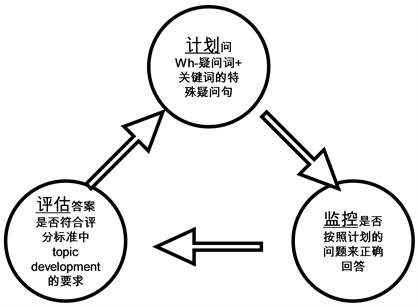

托福口语评分标准(TOEFL Speaking Scoring Rubric)中,对答题内容(topic development)的高分(4分)要求为“sufficient”与“well-developed”,这意味着考生需要提供细节以扩展话题。可惜,大部分考生在完成口语独立任务时只能回答几句简单句,既无细节,也无扩展,分数自然不够理想。为了帮助托福考生解决这个难题,许多托福口语教师会教学生“固定思路”与模板,以帮助学生展开话题,应对独立任务的考题。这个方法看似简单有效,因为学生不需要思考如何回答题目,只需记熟教师提供的思路,考试时背出即可。但考试中一旦遇到固定思路无法契合的题目,如果学生还是生搬硬套背熟的思路,结果很可能是跑题或影响语言的连贯性。此外,托福口语考试的目的在于帮助学生在美国顺利地学习与生活,只能背诵几个思路明显无助于他们的生活沟通和学术交流。诚如荷兰心理实验语言学家Albert Postma所言:“To err is human, to self-repair is fortunately also” [1],学生已有的知识体系与生活经验是足以应对托福口语独立任务的。因此,与其让学生被动接受与背诵教师提供的固定思路,不如教会学生主动思考、自行修补内容、扩展答题细节,达到托福口语评分标准的高分要求。
1976年,美国斯坦福大学心理学教授John H. Flavell提出了“元认知”(metacognition)的概念。他将元认知定义为“认知主体关于自身认知过程、认知结果及相关活动的知识,包括对当前正在发生的认知过程、自我认知能力、以及两者相互作用的认知,也包括对这些过程的积极监测与调控” [2]。元认知概念中最重要的组成部分是元认知调节(metacognitive regulation)策略,包括计划策略(planning)、监控策略(monitoring)与评估策略(evaluating) [3]。通过元认知调节,学习者知道自己需要知道什么,并通过制定学习计划、监控学习行为、评估学习结果与效率来达成学习目标。在托福口语独立任务的备考过程中,自我提问(self-questioning)是一种行之有效的元认知调节策略 [4]。通过自我提问,学生可以激活已有知识、深入理解话题、拓展思路与丰富答题细节 [5]。本文将这种自我提问的方法称为“Wh-细节修补法”,即考生面对托福口语独立任务考题时,并不依赖固定的思路或模板来答题,而是主动计划使用“Wh-”疑问词,如why、what、who、when、where、how等,与题目中的关键词组合成特殊疑问句,进行自我提问;而后回答问题,同时监控回答是否与自我提问的内容一致;继而评估回答是否契合口语评分标准中对topic development的要求;然后重新计划、监控与评估,深层提问与自行修补更多细节;最后将所有回答整合为独立任务的答案。
现在,我们以2014年9月的托福口语独立任务为例:“Do you agree or disagree with the statement: it is more important to have more facilities rather than hire more teachers?”假设学生选择的答案为同意“it is more important to have more facilities”。虽然选择答案不难,但大部分学生对于答题思路感到很困惑,想不出要回答什么内容才好。此时,教师不是直接教学生答题思路,而是引导学生使用“Wh-细节修补法”,通过自我提问与回答、修改回答、整合回答,一步步地得出满足托福口语评分标准中topic development的高分答案来。
第一步:计划。
元认知的计划策略指的是选择合适的学习策略 [6]。学生拿到题目时,并不知道可以使用“Wh-细节修补法”,因此老师需要引导学生了解这种答题方法。首先,老师可以问学生,“题目中哪个词是关键词?”学生一般都能迅速指出关键词为facilities。然后,教师可以要求学生使用“Wh-疑问词 + 关键词”(why/what/who/when/where/how + facilities)来造特殊疑问句。这个任务对于托福考生来说轻而易举,所以学生很容易就可以造出特殊疑问句来,比如:
1) Why do students need facilities?
2) Whatfacilities do students need?
3) Who use facilities?
4) When do students need facilities?
5) Where do students need facilities?
6) How do students use facilities?等。
据Richard T. Ward和Darrell L. Butler的研究,元认知意识(metacognitive awareness)对于学生的学习可以产生积极结果,而且教师的引导能够帮助学生培养元认知意识 [7]。因此,在学生造句之后,教师还需要帮助学生树立元认知意识,即学生不仅需要找出关键词与造句,还需要了解学习方法、以及方法的目的,并且有意识地为达成目的而采取行动 [8]。如教师可以引导学生回顾刚才做了哪两个任务,还可以引导学生思考为什么要做这两个任务(找出关键词语使用“Wh-疑问词 + 关键词”来造特殊疑问句)。当学生明白这两步可以帮助他们得到答题需要的细节时,学生就能理解这样做的目的。此外,教师还可以告诉学生,这就是元认知的第一步“计划”,之后学生还需要监控自己的回答、评估答案是否符合评分标准的要求,只有这三步都完成,学生才能更好地调整答案,从而拿到topic development的高分。当学生有了元认知意识,理解了计划包含的学习步骤,就能更有意识、更有效地计划找出关键词和造特殊疑问句了。
第二步:监控。
监控是元认知自我调节策略中非常关键的步骤,指的是学习者监控学习过程是否能达成计划的目标 [9]。如目标已经达成,学习者会选择停止学习;如目标尚未达成,学习者将继续学习,直至达成学习目标 [10]。当学生造好特殊疑问句后,教师可以引导学生自我回答这些特殊疑问句或同伴互答。与此同时,学生需要监控自己有没有达成学习目标(按照计划的问题来正确回答)。如发现自己未按照自我提问来回答,学生则需调整回答的内容,直至回答正确。学生对于以上特殊疑问句的回答可能如下:
1) To improve their ability
2) Computers, Ipads, microscopes, calculators, etc.
3) Science students
4) At present or in the future
5) In laboratories
6) Follow professors’ instructions
第三步:评估。
评估指的是对学习结果的衡量,如评估结果不满意,则会重新计划、重新监控、重新评估 [6]。学生需要对比自己的回答是否达到了评分标准中topic development要求的“sufficient”与“well-developed”。如果回答如第二步所示,经过评估后,学生会发现,自己的大部分回答都只有几个单词,拓展不够、细节也不充分,未达到评分标准的要求。
这个步骤之后,教师可以请学生自己总结刚才的做题流程:1) 找到问题的关键词→ 2) 使用“Wh-疑问词 + 关键词”造特殊疑问句→ 3) 回答→ 4) 监控回答→ 5) 评估是否符合评分标准要求,并告知学生这就是“Wh-细节修补法”:第一步和第二步是学生的自主学习的“计划”、第三步和第四步是自主学习的“监控”,第五步是“评估”。评估结果如果为“未达成评分标准要求”,则应该继续修补细节,即重新计划找关键词和自我提问、重新监控回答、重新评估回答是否符合评分标准。这个过程看似繁琐,其实非常有必要,因为这是学生检查认知加工的产品(语言产出:回答)和元认知加工的产品(监控与评估回答是否符合评分标准要求)之间的相互作用并采取行动的过程 [11]。当学生意识到回答还未达到评分标准的需求,第二轮元认知调节就开始了。
第二轮元认知调节:
第一步:重新计划。
假设学生首先问自己的问题是“Why”,在得出回答“To improve students' ability”之后,教师可引导学生在此回答的基础上继续使用“Wh-疑问词+关键词”来造句。但是,此步的提问关键词不再是考题中的facilities,而变成刚才回答中的students’ ability。
学生仍然可以轻松造出Wh-疑问词 + ability的特殊疑问句,如:“What ability can be improved?”
第二步:重新监控。刚才问题的回答有很多种可能性。我们假设学生的回答为:Hands-on skills。
第三步:重新评估。这个回答拓展仍然不够、细节依然不够充分。
教师引导学生做完两轮“Wh-细节修补法”后,学生一般已经明白了做题的步骤,可以主动进入第三轮计划、监控与评估。
第三轮的关键词变为Hands-on skills。
第三轮元认知调节:
第一步:再次计划。
学生再继续使用When + Hands-on skills来自行提问,如:“When can students use hands-on skills?”
第二步:再次监控。
回答:At present and in the future.
第三步:再次评估。
可能有些学生已经满足于三轮回答中提到的细节。但可能有些学生仍然不满足,会继续进行第四轮计划、监控与评估,可能深入提问Wh- + at present and in the future的相关问题,如:Why should students use hands-on skills at present and in the future? 回答:To solve problems in their academic study at present and face potential challenges in the future. 这次的评估一般学生都会认为已经比较接近评分标准中topic development要求的“well-developed”和“appropriate detail”的要求了。
此时,教师可以介入并告诉学生托福口语独立任务回答的时间有限(45秒回答两个点),以上的回答已经拓展充分了。然后,教师可以引导学生加入连接词、合适的时态与语法,将所有回答整合为考题的答案:
考题:It is more important to have more facilities rather than hire more teachers?
第一轮回答:To improve students’ ability (Why)
第二轮回答:Hands-on skills (What)
第三轮回答:At present and in the future (When)
第四轮回答:To solve problems in their academic study at present and face potential challenges in the future (Why)
整合后的答案:It is more important to have more facilities because students’ ability can be greatly improved, especially their hands-on skills (what). Using facilities gives students opportunities to solve relevant problems in their academic study during their college life, and will help them face potential challenges (why) in their future work as well.
得出答案后,教师可以请学生再次评估这个答案是否吻合评分标准中的高分要求。学生会发现,通过四轮“Wh-细节修补法”后,自己已经有了答题的思路,而且答案中已包含了大量细节,如why,what和when,充分满足了“sufficient”与“well-developed”的要求。
据Anastasia Kitsantas的研究,元认知自我调节(metacognitive self-regulation)的能力对考生的考试成绩能产生积极影响 [12]。这种能力包括了解学习意识与计划学习方法 [13]。因此,教师可以在此时帮助学生梳理托福口语独立任务的做题思路,并培养学生使用元认知策略来答题的意识(图1):

Figure 1. Process of Wh-Detail Patching Method
图1. Wh-细节修补法的流程
此外,教师还可以引导学生发现,四轮“Wh-细节修补法”较适合托福口语答题的时间与长度要求。
以上就是教师如何引导学生使用“Wh-细节修补法”来回答例题Do you agree or disagree with the statement: it is more important to have more facilities rather than hire more teachers?的第一个观点(idea)。由于托福口语独立任务一般需要两个观点(ideas),因此教师可以让学生独立操练,再次使用“Wh-细节修补法”回答出第二个观点并自行修补细节,如:
首先,学生计划:从Wh- + 关键词的问题中选择第二个:Who use these facilities;监控回答:science students;评估:拓展与细节不够。
学生继续计划:使用What + students继续提问:What facilities do students need? 监控回答:Computers, Ipads, Microscopes, calculators, etc.;评估:拓展与细节不够。
再次计划:使用Where + computers, Ipads, Microscopes, calculators in laboratories提问:Where do students use computers, Ipads, Microscopes and calculators? 再次回答:In laboratories;再次评估:拓展与细节不够。
继续计划:使用Why + computers, Ipads, Microscopes, calculators in laboratories提问:Why do students usecomputers, Ipads, Microscopes, calculators in laboratories? 继续回答:To understand what they have learned from textbooks and turn theories to practical accounts.继续评估:拓展与细节充分。
整合答案:
考题:It is more important to have more facilities rather than hire more teachers?
第一轮回答:Science students (Who)
第二轮回答:Computers, Ipads, Microscopes, calculators, etc. (What)
第三轮回答:In laboratories (Where)
第四轮回答:To understand what they have learned from textbooks and turn theories to practical accounts (Why)
整合后的答案:And by using facilities like computers, Ipads, Microscopes and calculators, students, especially those specializing in science, are able to understand what they have learned from textbooks and turn theories to practical account in laboratories.
最后,教师可以引导学生把以上两个整合好的回答放在一起,再加上主题句、总结句、连接词,一个包括时间、地点、人物、事件、原因等“appropriate detail”的“well-developed”的答案就做好了。具体如下:
I consider it quite essential to have more facilities.
On one hand, students’ ability can be greatly improved, especially their hands-on skills. Using facilities gives students opportunities to solve relevant problems in their academic study during their college life, and will help them face potential challenges in their future work as well.
On the other hand, by using facilities like computers, Ipads, Microscopes and calculators, students, especially those specializing in science, are able to understand what they have learned from textbooks and turn theories to practical account in laboratories.
Therefore, how critical and crucial it is to have more facilities!
此时,教师可以引导学生再次评估这个答案是否符合评分标准“sufficient”与“well-developed”的要求。学生评估后,一定会对此答案的细节与拓展感到满意。不过,建议教师还给学生提供一个元认知调节策略清单(metacognitive regulation checklist),这份清单有助于帮助学生有意识地回顾自己的元认知学习策略、更有效地调整学习过程与学习行为 [14]。本文列出了以下托福口语独立任务的元认知调节策略清单,谨供各位教师参考。
1) 我找出了题目的关键词A吗?
2) 我是否根据题目关键词A自我提问了特殊疑问句B?
3) 我是否根据特殊疑问句的回答C找出了新的关键词A1?
4) 我是否根据关键词A1再次自我提问了特殊疑问句B1?
5) 我是否根据特殊疑问句B1的回答找出了新的关键词A2?
6) 我完成了四轮找关键词、自我提问和回答吗?
7) 我整合了四轮回答吗?
8) 整合回答时,我加入了主题句、总结句、连接词吗?
9) 最后的答案符合托福口语评分标准中“sufficient”与“well-developed”的要求吗?
“授人以鱼,不如授人以渔”。不按传统方式教学生套用固定思路与模板答题,而让学生意识到自己的不足,进行批评性反思,采取元认知的调节策略,独立完成任务,这正是自主学习的过程 [15]。通过教师的引导与自我反思,学生能够有意识地使用“Wh-细节修补法”,计划自行提问、监控回答、评估与评分标准的差距,继而重新计划、重新监控与重新评估,最终整合回答为完整答案。有了这样有效的元认知答题策略,学生应该不会再为无法拿到托福口语独立任务的高分而发愁了。